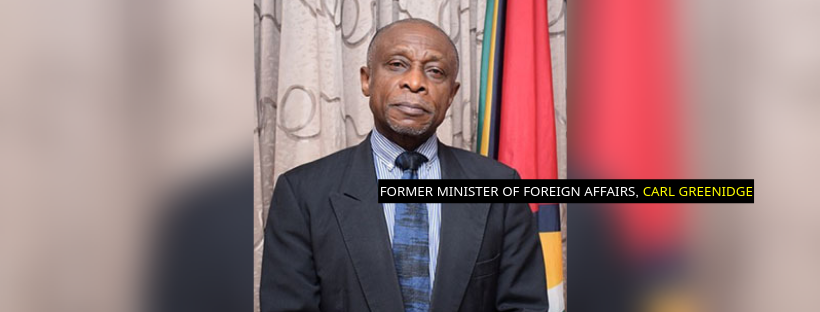Foreign Secretary, Carl Greenidge disclosed moments ago that his application to renounce his UK citizenship has been approved. The move is one that not only improves Greenidge’s prospects of holding a ministerial title but also being a future Parliamentarian.
See below for his full statement to the press.
In keeping with the undertaking I gave to the Press earlier this week I am in a position today to announce that I have received from the relevant British authorities, confirmation that my application to renounce my British citizenship has been accepted. I have informed President Granger accordingly and therefore look forward to being included on the list of candidates from which the Party will make its selection of MPs following the holding of the Regional and General Elections in 2020.
UK citizenship and residence enabled me to take advantage, largely free of cost to my parents, of wide-ranging educational opportunities which I would not have been in a position to access or finance had I remained in Guyana. I was subsequently able to gain invaluable employment and vocational experience in the employ of UK Government agencies before returning to Guyana to serve. I am grateful to have had that privilege and through it to have attained the goals to which my relatives and many Guyanese aspire.
In Guyana, I have served at the highest levels professionally, at the University and in the Public Sector as Chief Planning Officer and Secretary to the State Planning Board, for example, before being invited to enter Parliament. Having given up a promising academic career for politics, my record as a Minister and as a successful negotiator in particular for Guyana and developing states, is rivaled by very few other Guyanese. I stand ready to continue that contribution.
In the wake of the successful passage of the No-Confidence Motion of 2018, the question of fitness for public office has gained prominence in the public debate. The two main political parties had sought by an amendment to our Constitution a provision which the Courts found inadequate if the intention was to prevent crossing of the floor by an M.P. As observed by the learned members of the CCJ, the Westminster Constitution from which ours is derived permits M.Ps to cast a vote against the Party via which they gained membership of the National Assembly. They put great store by that fact. Whilst we must accept their interpretation of the legislation, an M.P, who having declared his opposition to a motion immediately before it is debated, nonetheless proceeds to vote in favour of it, is someone without integrity. Lack of integrity is not an affliction restricted to dual citizens.
It is obvious therefore that this is still a hazard waiting to happen again. People betray commitments and principle for reasons other than nationality and in the case at hand the M.P neither acted as he did nor got away with this act because he was a Canadian. Some people betray their colleagues or countries for love and even more, do so for love of money! Of course, Shakespeare would remind us of ambition.
The threat will remain as long as there are anomalies in the Constitution. The CCJ members as well as learned Counsels highlighted some including, more stringent citizenship requirements for an M.P than for a Chief Justice or President and most importantly that the provision collides with fundamental rights provisions. Nevertheless, the public’s attention has been diverted to nationality (without reference to the significance of its various forms) rather than to remedying these anomalies or to the equally critical issue of ensuring the integrity of members of the House.
As I look to the future I trust that we will be able, with the assistance of the new Parliament, to focus on some of these fundamental challenges facing the nation rather than on simplistic panaceas.













